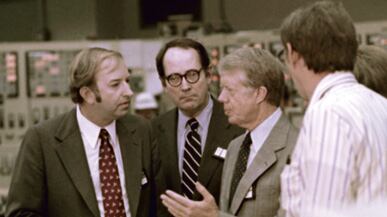As Japan races to avert a nuclear crisis, the governor who oversaw America's 1979 meltdown talks to Eleanor Clift on how he handled the disaster, his advice for Japanese officials, and the future of nuclear energy. Plus, shocking photos and videos from Japan and full coverage of the nuclear fallout.
Richard Thornburgh is watching the developments in Japan with a keen sense of déjà vu. He had been in office as Pennsylvania governor only 72 days when he was confronted with a potentially catastrophic event at the Three Mile Island nuclear reactor near Harrisburg. It was resolved without cost to human life, or the environment, which by no means is certain in Japan.
"I wouldn't want to be in their shoes," he said in an interview Saturday.
Photos: Japan's Earthquake

Thornburgh was having a breakfast meeting with legislators on the morning of March 28, 1979, to talk about the budget he had just presented when he got a call from an emergency-management official saying there had been "an accident" at Three Mile Island. "I knew immediately that it was nothing trivial," he said.
Though what occurred in Japan is the result of a natural disaster, the Republican says, the challenge officials face is identical: "To get a grip on what the facts are." That's difficult when you're dealing with complicated technology and an abundance of experts, often with their own agendas. Thornburgh, who would later serve as attorney general in George H.W. Bush's administration, drew on all his lawyerly skills, "questioning and cross-examining them until you get some sense of what's going on inside that facility."
The accident happened on a Wednesday, and it took about five days before he had a real understanding of what was unfolding. On Sunday, amid the uncertainty, President Jimmy Carter, a nuclear engineer by training, sought to reassure the American people by personally visiting and touring Three Mile Island. "That was a boon for us," Thornburgh says. "Although our politics are different, I was always grateful to him for coming."
Thornburgh cautions that “there’s nothing inherently unsafe about an explosion—it depends what exploded.”
The big question Thornburgh faced was whether to evacuate people from the surrounding area. "That's not to be undertaken lightly," he says. Moving elderly people, and people in hospitals or nursing homes, "you want to avoid that if you can." Many residents left voluntarily, and pregnant women and children within five miles of the nuclear reactor were evacuated—which turned out to be unnecessary, but seemed prudent based on what was known at the time.
In Japan, of course, evacuations were promptly ordered, based on the nature of the damage and the leaking radiation. Thornburgh's advice to his counterparts in Japan is to "just keep plowing ahead on getting a grip on the facts. Make sure the right experts are in place. The quality of the facts is going to determine the quality of the outcome."
The accident at Three Mile Island was over in about five minutes, though the full extent of the damage was not known until months, even years later. A valve stuck in the open position released water from the cooling system and an operator turned off the emergency cooling system, which resulted in the partial meltdown of the reactor core. It was a combination of equipment failure and human error.
Aside from gathering the facts, Thornburgh stresses the importance of maintaining honest communication with the public. "The most fragile commodity for anyone in public office is their credibility," he says. His credibility was put at risk in the immediate hours after the accident when he downplayed the potential seriousness of the accident, relying on what he says turned out to be misinformation from the utility that ran the nuclear plant. "I immediately said I made a mistake. And after that I was able to speak with some credibility because I owned up to the mistake."
Thornburgh was the principal spokesman throughout the disaster, and that's another lesson for officials in Japan as they work their way through what's happening: The public needs someone it can trust to guide them through the crisis.
A number of studies have showed no adverse environmental or health effects after the accident at Three Mile Island, but that was not at all certain at the time. "We were dealing with what was then a totally unknown technology, and we'd been fed a steady diet of how safe it was," says Thornburgh, now a Washington lawyer. "A lot of myths exploded about nuclear technology by what happened at Three Mile Island."
Asked his view of nuclear power, which President Obama has sought to encourage through construction loans, Thornburgh says "there's a place for it" and notes that some environmentalists now champion nuclear reactors as a way to combat global warming. He credits Three Mile Island with "raising the ante" on safety, with the result that nuclear power today is "monumentally safer than it was in 1979."
Watching the television coverage of Japan disaster and the ominous news of an explosion at one of its nuclear power plants, he cautions that "there's nothing inherently unsafe about an explosion—it depends what exploded." The Japanese have paid careful attention to safety and standards, unlike the Russians, who confronted a similar catastrophe with their reactor at Chernobyl in 1986. When he visited Chernobyl years earlier, Thornburgh recalls, it didn't even have a containment facility.
Eleanor Clift is a contributing editor for Newsweek.






